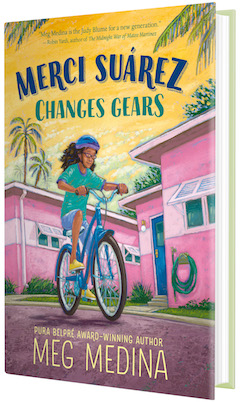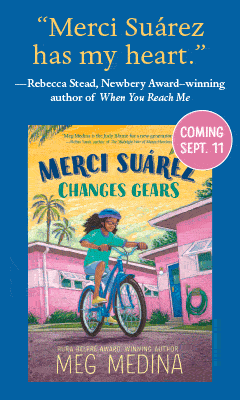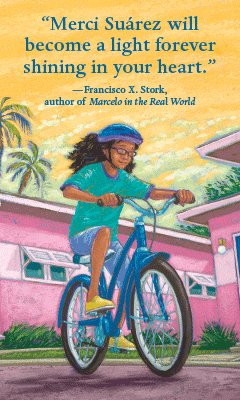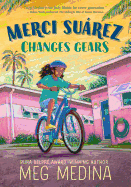Merci Suárez Changes Gears
by Meg Medina
Meg Medina's newest middle-grade novel, Merci Suárez Changes Gears, is as funny and moving as its protagonist is enterprising, bright and forthright. It's a work that perfectly depicts the loving, flawed nature of family and the humorous, often confusing and sometimes painful experience of moving from childhood to adolescence.
Merci's family lives in "three flat-top houses" that sit side by side on their South Florida street. Merci, her 17-year-old brother, Roli, and her parents live in the left-most of the three "pink triplets"; her Abuela ("manager of the Catastrophic Concerns Department" in their family) and Lolo live in the middle; and her tía Inéz and twin sons Axel and Tomás live on the right. "Roli calls it the Suárez Compound" but Merci's Mami "hates that name"--she calls it Las Casitas, the little houses, instead. Merci, 11, has grown up on this communal property, her family life sprawling through all three homes where they share meals, tell stories and divide up the labor: "When it comes to helping," Merci thinks, "the motto around here is family or bust." Which means that when the twins--whom "even the friendly librarians downtown have banned... from story time,"--need babysitting, Merci is asked to step in; her tía thinks no one "in their right mind would hire a stranger to watch their kids when they have relatives around."
One of the many joys that come alongside the many annoyances of this life is Merci's relationship with her grandfather. For as long as she can remember, Lolo has been in charge of walking the family's children home from school. "In fact," Merci remembers, "it used to be my favorite part of the day when I was still at Manatee Elementary. We'd stroll, nice and slow, so I could tell him all that had happened each day, especially the highlights from recess." But last year, because Mami "is all about getting a good education," Merci joined Roli at Seaward Pines Academy, a fancy private school out of walking distance. Both are there on scholarship and have to maintain a B-plus average as well as doing, in Merci's words, "sixty whole hours of free labor every year." This is a piece of cake for genius Roli, whom you "can practically smell the future Nobel Prize on," but school doesn't come as naturally to Merci.
Beyond being a scholarship student who has weird living arrangements and gets driven (extremely slowly) to school by her newly permitted brother, Merci also has an eye that "strays sometimes" (especially when she's stressed) and is having difficulty adjusting to sixth grade. "I really wanted it to be fun," she tells Lolo, "better than fifth grade, anyway. But there are all these classes to keep track of now." To make matters worse, Miss McDaniels has decided that Merci should join the student ambassador program--who better to introduce new students to the school than someone who is relatively new? Merci, who really just wants to mind her own business during her community service time, does not want to be a Sunshine Buddy. She especially does not want to be paired with Michael Clark from Minnesota, "the biggest and whitest boy [she's] ever seen." What Merci does want to do is to try out for the soccer team. Merci is a great athlete--her Papi even lets her play soccer with him and his adult friends--and she's sure she can make the team. But, somehow, Mami keeps forgetting to sign her permission slip.
And Mami isn’t the only one forgetting things: Lolo is acting weird. When Merci comes home from school to find Lolo locked in the back seat of a police cruiser, she asks him what's going on. "It was a little misunderstanding," he says, "It's these glasses!... They're terrible!" which makes no sense to her. What do glasses have to do with being in a police car? According to the twins, Lolo went to pick them up from school and tried to pick up the other set of twins--who are Vietnamese. Merci doesn't think bad glasses are a solid excuse for a mistake like that, and she remembers the time Lolo was convinced he had been pickpocketed at the bakery, only to have Abuela find his wallet in the garden. It feels to Merci like the adults know what's going on with Lolo, like they have a secret, but Abuela believes "[c]hildren don't need to hear life's ugliness" and Mami is being tight-lipped. Merci doesn't understand what's happening with Lolo, she doesn't understand why some of the girls want to hang with the boys, she doesn't understand why Mami won't give her permission to play soccer....
Merci Suárez Changes Gears balances all of Merci's issues with the apparent ease one has come to expect of Meg Medina. Merci's voice is spirited, quick-witted and unmistakably 11 years old. A sixth-grade scholarship kid in a wealthy school with a genius brother, a quirky family and a grandfather with Alzheimer's is a lot, but Medina makes it seem effortless. She layers the funny on top of the painful on top of the beautiful on top of the bewildering--and expresses the raw, sensitive nature of being. Merci and the Suárezes are supremely lovable and, while the book has a gratifying end, readers will surely want more time at Las Casitas. --Siân Gaetano, children's and YA editor, Shelf Awareness









